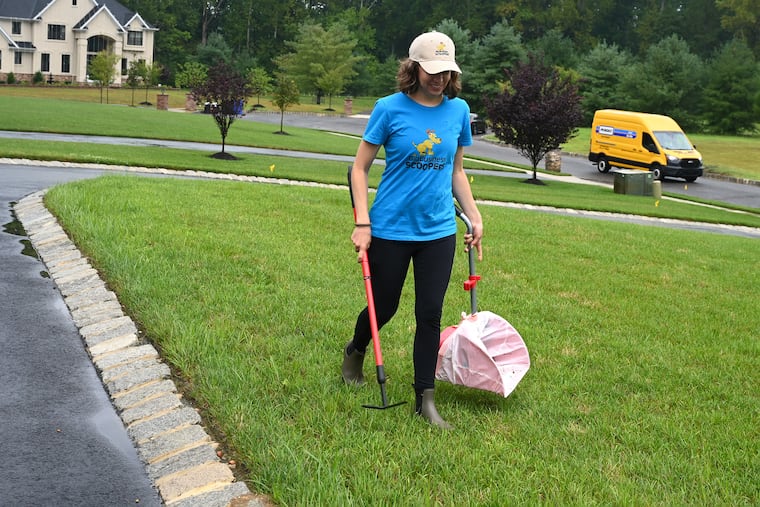People who scoop dog poop for a living in Pa. and N.J. can rake in big bucks
Business owners cash in when dogs do their business.

Fendi, the 3-year-old golden retriever who can’t get enough cuddles, stared at the expanse of Mullica Hill lawn where she does her business.
There in the grass, which she’s been using as her personal privy, walked an intruder — Emily LaBeaume, a professional poop scooper and co-owner of Big Business Scoopers of Pitman.
Using a rake and a bucket with a long handle, LaBeaume was picking up what Fendi had been putting down.
Is Fendi offended that the territory she’d marked is being cleared out? Or does a dog named after an Italian luxury fashion house believe that writing checks to a human to clean up after animals is precisely how the world should run?
None of that matters to Fendi’s owner, Taylor Kemery, 31, a pediatric nurse practitioner who pays LaBeaume’s company around $20 a week. “This is a great convenience,” she said. “I never enjoyed picking that stuff up. Ever.”
If you can pony up bucks for someone to cut your lawn, deliver your groceries, or assemble Ikea furniture, why not throw money at a practitioner who performs an unceasingly odious task?
“Customers are either grossed out, physically unable, or don’t have the time,” said Tim Stone, 36, of Dallas, president of the national Association of Professional Animal Waste Specialists (aPAWS), who runs Scoop Masters, with branches in Dallas-Fort Worth, Los Angeles, Jacksonville, Fla., and Nashville.
Stone isn’t bothered by people who laugh at his profession.
“I take in $1.8 million a year from Dallas-Fort Worth alone,” he said. “I pay some of my employees $40,000 to $50,000 to pick up dog poop.
“I couldn’t care less what people think about what I do for a living.”
Poop scooping can be lucrative, generating approximately $500 million annually, Stone said. Much of that has been fueled by the glut of pandemic dogs, taken in by folks looking for quarantine companionship. Stone added there are roughly 550 such businesses operating nationwide, with around 10 in the Philadelphia region and throughout New Jersey.
Mike Zlotnick, 60, owner of Poopie Scoopers R-Us, headquartered in Northeast Philadelphia, said his clients are “the top 3% with disposable income who can afford this work,” for which he charges $20.50 to $26.50 a week, depending on the number of dogs.
He’s a maverick who collects fecal matter with (gloved) hands to “not miss anything.” His work takes him to the city’s collar counties.
“It’s a suburban job — not many city calls,” said LaBeaume, 35, who studied English literature at the College of New Jersey, and worked in publishing. She employs 11 people and has around 500 New Jersey clients, many in Gloucester and Camden Counties.
“I love the work,” she added. “You’re outside, playing with dogs. We tell employees to listen to podcasts or music, or just daydream. Scooping poop is weirdly calming.”
She said she’d like to expand into commercial areas like parks: “That’s where the meat and potatoes are.”
Toiling in a relatively unknown vocation, animal-waste specialists can be particularly quirky. On Sept. 15, practitioners will hold a convention in Myrtle Beach that will feature “turd herding,” in which fake dog excrement is hidden throughout the hotel to be rooted out by motivated stool seekers.
“Prove to the world … [you’re] the fastest pooper scooper … and have … bragging rights for the rest of the year,” the aPAWS website enthuses.
‘We saved her marriage’
The profession likely started in Southern California in the 1980s, said Keith Brandt, owner of Poop Genie, with offices in Dauphin County and King of Prussia. Out West, perpetually warm weather causes dog waste “to stink every month, as opposed to just four hot months around here,” making the job a necessity, said Brandt. He said he likes to work “the really big lawns and yards” of Chester County.
“Our customers are millennials, progressive people who think outside the box,” many with two incomes, Brandt, 44, said. “They work hard and prefer going to their kids’ football practice. We take one big chore off their plates.”
Tracy Clevens, co-owner of Clevens K-9 Scoop, based in Wilmington, has a large clientele in Bryn Mawr and Newtown Square. She said her crew helps couples who bicker over whose turn it is to jump in when doody calls.
“A woman told us we saved her marriage,” said Clevens, 47.
One of her clients, Valerie Asbury, 64, of Malvern, said people “roll their eyes because I pay someone” to tidy up after her three pit bull-mixes. But, said Asbury, who works in the glucose-monitoring industry, “it makes life easier and it’s worth every dime.”
Some avoid canine cleanup by saying that leaving the stuff in the grass fertilizes the yard.
Untrue, say Clevens and the EPA.
Droppings release pathogens that cause bacteria and viruses that threaten humans. They take a year to decompose, and can leach phosphorous and nitrogen into water supplies, depleting fish population and promoting algae growth.
LaBeaume is proud her work prevents all that. An added benefit is that scoopers can notice blood or worms in dog feces, possibly indicating a problem.
Sometimes, she said, people ask whether too many competitors are crowding the field.
“Everyone has dogs,” LaBeaume said. “I never worry there won’t be enough to pick up after.”